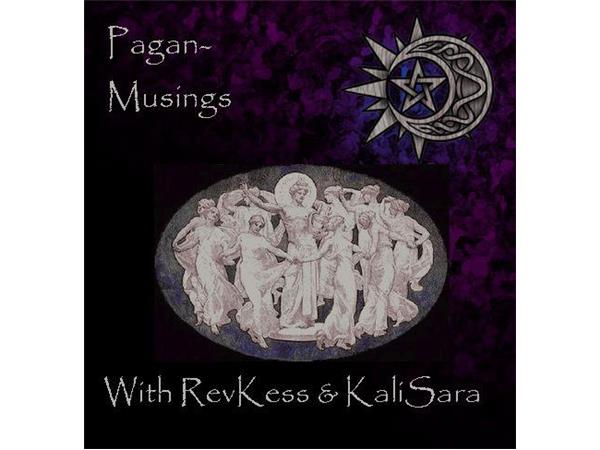Star Foster recently added her name to the growing list of Polytheists who have dropped the Pagan label. [It looks like her post has now been taken down.] (It wasn’t too long ago she was telling everyone how much she loved being Wiccan.)
Jason Mankey says there’s no running from the Pagan label (There’s nothing like telling people they can’t run to make them want to run.) and then appeals for “Big Tent Paganism”. (There’s over 200 comments too! Although almost 50 of them are by semi-professional blog commenter Lēoht Sceadusawol. Dude, get your own blog!) Can’t we all just get along?
Kenny Klein says “yes”, unless you dig Jesus, or are an atheist, or worship the Valar (the gods in J.R.R. Tolkien’s mythos) — oh, and owning a drum is not enough. (Note: In the comments below, Kenny says the Valar are okay.)
Kenny’s “significant other” (Lauren DeVoe) throws in her 2 cents.
Jonathan Korman tries to redefine the question as one of “pagan sensibility” (but in my opinion ends up proving the Polytheists’ point about Pagans). [Note: Jonathan’s post actually predated, and so was not in response to, Star’s announcement.]
Eric Fritter Riley suggests that the diversity of our experience of small-t truth is precisely what makes us Pagan. I liked this response a lot. (It’s not a coincidence that Eric’s blog is titled “Unsubstantiated Personal Gnosis”.)
Ian Corrigan feeds the flames by insisting that you’re all Pagans, whether you like it or not.
Teo Bishop analogizes the situation to reality T.V. and then to the trans-/queer confusion (leaving me really confused — which maybe is a good thing).
P. Sufenas Virius Lupus makes his case that Paganism needs gods (which I found myself simultaneously agreeing and disagreeing with, so much so that I felt compelled to respond over at PaganSquare.
Stifyn Emrys takes issue with Lupus’ “Pagan fundamentalism”.
Lupa cautions against Pagan Fundamentalism, too.
Christine Kraemer responds to Lupus and offers up a tripartite Venn diagram to explain this mess. (There’s some overlap between Christine’s diagram and my own.)
Peter Dybing counsels that all of this is part of the growing process (and he should know).
Chas Clifton just doesn’t want anyone to start uncapitalizing the word “Pagan” again. (Does anybody know if we’re supposed to capitalize “polytheist”?) (P.S. after the exchange in the comments below, I’ve decided to capitalize it.)
And Crystal Blanton is too busy living her Paganism to get into it with you about whether you are or aren’t Pagan.. (You’re so vain, you probably think this post is about you, don’t you, don’t you?)
“Thalassa” wonders if this isn’t just all the same old thing, among her other musings.
Taylor Ellwood says “Paganism” is fine as a “meta-label”, but it doesn’t really fit.
Heathen Joseph Bloch argues that there is no such thing as Pagan community, and for that matter “Paganism” is an illusion too.
“Chirotus Infinitum” says Pagans are Polytheists … unless they’re Wiccan, and then makes room for “outliers”. I never ceased to be amazed at how every Pagan wants to make their own vision of Paganism the center of the Pagan universe.
One Hellenic Polytheist tumblrer is “done playing nice with this fluffy neopagan bullsh*t”. [This actually was not a response Star’s announcement, but it was a recent example of one extreme in this discussion. The number of “likes” and reblogs was disturbing.]
Heather Greene collects quotes on “Pagan solidarity”.
Last but not least, Julian Betowski counsel against defining Paganism in contrast to (or even in comparison with) Christianity. Reading Julian’s post, I realized that the fact that this debate is even happening is maybe a good sign, because it likely means we are no longer defining ourselves so much in reaction to Christianity. The result is that we are no longer bound together by a shared experience of (real or perceived) Christian oppression and the subsequent identity crisis. I want to close with an excerpt from Julian’s post, which resonated with me:
“I firmly believe that if we are to continue to identify as a single community despite the broad variations which Modern Paganism contains that we need to do a lot of work as a community to build a coherent and cohesive definition. In doing so, however, we need to be willing to set aside our own identity defenses and end up in inter-community bickering, trying to establish ourselves as more Pagan than you. There is a large array of characteristics which combine and overlap to describe contemporary Pagan practice, and we need to be careful not to privilege anyone of those over the others. Doing so only leads to defensiveness and tension between different Pagans and Paganisms. We cannot reduce Paganism to Polytheism versus Monism, nor Nature Worship versus Deity Worship, nor thaumaturgy versus theurgy, nor any any other combination of polar relations.”
If you know of any more good posts related to this discussion, let me know and I’ll add them.















